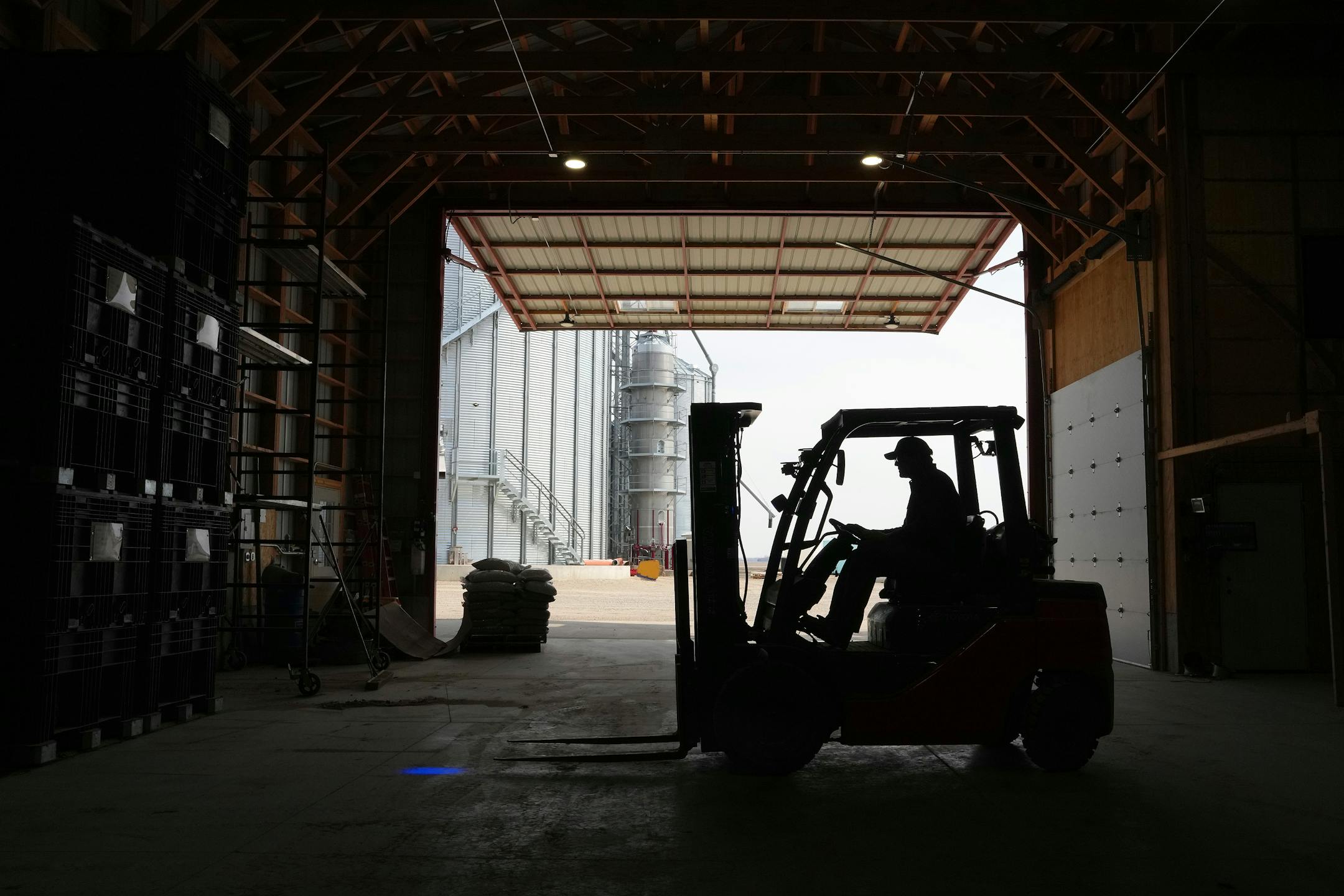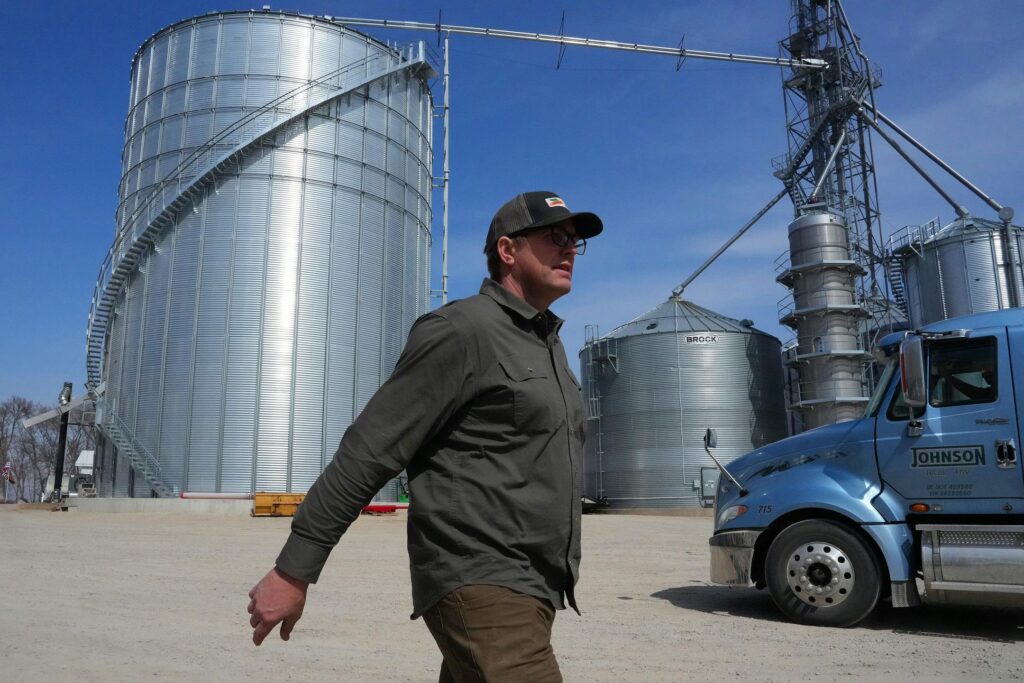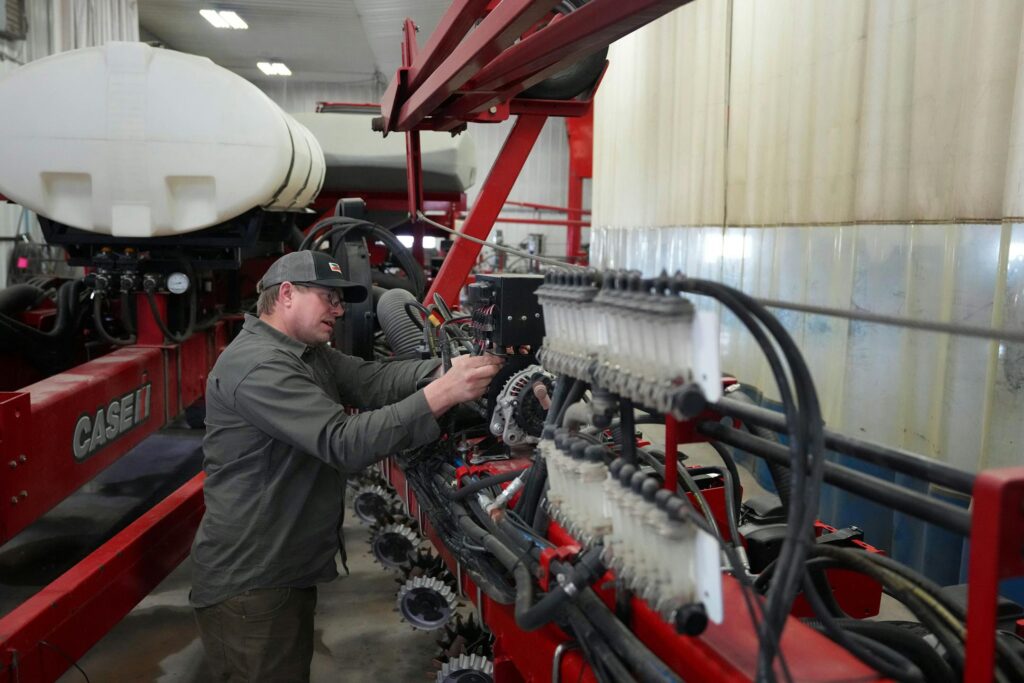![]()

Darin Johnson, president of the Minnesota Soybean Growers Association, organizes and moves soybean seed around to be shipped out to farms for planting on Wednesday at his farm in Wells. Soybeans are Minnesota’s biggest export with about 30 percent of the state’s crop exported to China that could be impacted by President Donald Trump’s tariffs. (Anthony Souffle/The Minnesota Star Tribune)
WELLS, MINN. — Everything seems to be humming along on Darin Johnson’s farm. A trencher lays irrigation tile in a field hugging Interstate 90 that lopes over these southern Minnesota flatlands. An 18-wheeler fills up with golden grain. Planting is around the corner.
But beneath the routine, anxiety lurks. This soybean farm is on the frontlines of America’s trade war with China.
A day prior, Johnson, president of the state soybean lobby, welcomed a French television crew to his farm. Weeks ago, Johnson drove up to the Twin Cities to talk with a visiting Canadian delegation.
Visitors to the farm usually want to know the same thing: How will they weather the price increases?
So far, the answer is unknown.
Johnson, a tall, straight-backed farmer, almost crumpled around noon Wednesday after he pulled out his phone to discover the latest out of Washington D.C.
President Donald Trump had paused tariffs on nations, across the globe. Except for China.
The Republican president raised tariffs on Chinese goods to 125%. China is the largest buyer of American soybeans — including about one of every four rows of those grown in Minnesota — and has retaliated with a 125% tax on U.S. goods.
“You just don’t honestly know what’s going to happen from one day to the next,” Johnson said, shaking his head.![]()

Darin Johnson walks between buildings at his farm in Wells. (Anthony Souffle/The Minnesota Star Tribune)
Soybeans are Minnesota’s largest export, producing $2 billion annually, more than taconite and medical devices.
Some beans get trucked to elevators on the Mississippi River. But the largest share of beans are loaded on rail cars and shipped to the Pacific Northwest. They then board ships and arrive in Asia.
Soybeans originated as an Asian crop. They’ve been grown by farmers in the Midwest since the 19th century as feed for livestock. By the 1940s, production boomed across the heartland for use in everything from oils to plastics for Henry Ford’s assembly line.
By the dawn of the 21st century, soybeans were flooding into biofuels plants popping up across the region. The industry has looked to sustainable aviation fuel as the future.
But in the here and now, soybean farmers rely on foreign markets, none more than China, where the high-protein crop largely still feeds livestock.
“I am very confident that this is effectively an embargo,” said Jason Ward, a market analyst with Northstar Commodity. “It doesn’t matter [if the tariff is] 84% or 9,000%. It’s not going to get purchased.”
America runs a trade deficit with China. Trump administration officials have said the Chinese will hurt more from higher prices than Americans will hurt.
From autoworkers and the Teamsters to shrimpers in Louisiana, some cheered the tariffs.
But in America’s breadbasket, where the towering silver grain bins are filled with beans and corn headed for Asia, the farmers are bracing for economic pain.
“I truly hope that these tariffs will lead to negotiations and get us good trade deals in the near future,” said Johnson, a 1996 graduate of the high school in nearby Wells. “You just hope it doesn’t last very long.”
During the 2018 trade dispute with China, the U.S. ceded its top spot for soybean production to Brazil.
And while the Ukraine War propelled prices in 2022, well into President Joe Biden’s presidency, soybean markets have softened as input costs, from diesel to fertilizer, have stayed high. Meanwhile, weather swings only aggravated low crop prices and inflationary pressures.
“The last two years, from an economic standpoint,” Johnson said, “have been the worst in agriculture since 1977.”

![]()
Darin Johnson troubleshoots an issue with one of his planters. (Anthony Souffle/The Minnesota Star Tribune)
In 2021, an acre of soybeans netted farmers $230 on rented land. Last year, farmers lost $35 on that same acre, according to a new report from the Minnesota State Southern Agricultural Center of Excellence.
Flooding that blew out a dam and inundated cropland started the season and drought capped the season off.
“Beans tend to be more sensitive to fluctuations in weather,” said Brent Roiger, a farm business management instructor at South Central College in Mankato.
Now, as farmers are still reeling, a new trade war has launched.
![]()
